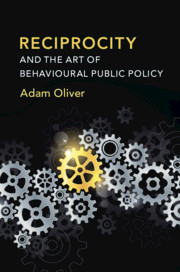Book contents
- Reciprocity and the Art of Behavioural Public Policy
- Reciprocity and the Art of Behavioural Public Policy
- Copyright page
- About the author
- Dedication
- Contents
- Figures and Tables
- Preface
- Acknowledgements
- 1 Setting the Scene
- 2 Animals and Infants
- 3 A Pinch of Anthropology
- 4 A Dash of Behavioural Economics
- 5 The Domain of Reciprocity
- 6 The Dark Side of Reciprocity
- 7 Nurturing Reciprocity in Public Policy
- 8 Reciprocity-Informed Policy Design
- 9 Towards a Political Economy of Behavioural Public Policy
- 10 Summing Up
- References
- Index
2 - Animals and Infants
Published online by Cambridge University Press: 06 July 2019
- Reciprocity and the Art of Behavioural Public Policy
- Reciprocity and the Art of Behavioural Public Policy
- Copyright page
- About the author
- Dedication
- Contents
- Figures and Tables
- Preface
- Acknowledgements
- 1 Setting the Scene
- 2 Animals and Infants
- 3 A Pinch of Anthropology
- 4 A Dash of Behavioural Economics
- 5 The Domain of Reciprocity
- 6 The Dark Side of Reciprocity
- 7 Nurturing Reciprocity in Public Policy
- 8 Reciprocity-Informed Policy Design
- 9 Towards a Political Economy of Behavioural Public Policy
- 10 Summing Up
- References
- Index
Summary
Reciprocity has roots that predate humans, and is something that is fundamental to the animal kingdom. Much of this behaviour is instinctive (i.e. attitudinal) – e.g. cats licking each other – but these actions may have served as the kernel for the development of more complex, deliberative forms of reciprocity. By common consent, however, although there are some examples of non-human primates and even other species arguably demonstrating a deliberative form of reciprocity and although we have much to learn about animal behaviours, a tendency towards more sophisticated forms of reciprocity that rely on memory and a sense of obligation is predominantly human. Indeed, the human talent for deliberative reciprocity and hence cooperation is an important explanation for why humans have been so successful at populating the planet and dominating other species. This urge to act reciprocally lies very deep within the human psyche. For instance, there is some evidence that very young children show tendencies towards deliberative reciprocity, and demonstrate some concern for a person’s reputation, which is crucial for the effective operation of indirect reciprocity.
- Type
- Chapter
- Information
- Reciprocity and the Art of Behavioural Public Policy , pp. 19 - 37Publisher: Cambridge University PressPrint publication year: 2019



